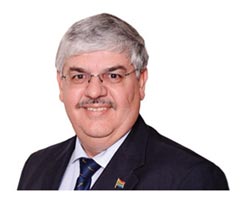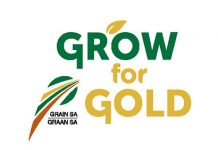August 2016
SA GRAAN/GRAIN EDITORIAL TEAM
The Sowetan daily newspaper on 20 June of this year published an insightful letter written by Mr Prince Mashele, under the heading, ‘Talk productively to Boers about land’. Mr Jannie de Villiers (CEO: Grain SA) personally responded on the views mentioned in the letter through a personal letter to Mr Mashele – which SA Graan/Grain consequently decided to publish.

Mr Prince Mashele’s letter
Dear Editor
Some very important event went unnoticed last month. It took place in a dorpie called Bothaville in Free State, from May 16 to 20.
Every year farmers from across South Africa converge to celebrate NAMPO Harvest Day at a venue called NAMPO Park in the sleepy maize-farming town in the middle of nowhere.
You drive through vast expanses of maize and sunflower farms until, suddenly, you get to a hive of activity where there are countless 4×4 bakkies that look like someone has just distributed them for free.
While you are still in awe of the 4x4s, your mind tells you that what you are seeing can’t be true: An enormous fleet of private aircraft and helicopters parked on a gravel terminal.
These 4x4s and helicopters bring farmers from all over the country, not just to celebrate Harvest Day, but to showcase all manner of animals, crops and giant agricultural machines you have seen only on TV. More importantly, the farmers use the week at NAMPO to have serious discussions on the state of agriculture in South Africa. The discussions are called Nation in Conversation.
What strikes one is that the ‘Nation’ that is in ‘Conversation’ and is almost all white, mainly Afrikaner.
Radical darkies might wonder, what do we have to do with Boers meeting in a town whose name sounds like South Africa before 1994? It does not matter how radical you are, the breakfast and lunch you have today was produced by the Boers who meet every year at NAMPO to have a conversation.
If those Boers were to stop producing food, millions of us will starve, literally. If they were to do that, black people will suddenly know Bothaville, the place where Boers talk about our food. Have you ever wondered where the tomatoes you buy from your supermarket come from, and who produces them? Does it occur to you that without Boers you would not have pap?
What is striking about NAMPO Harvest Day is that not only are there no black people, black politicians too are not there. Yet every day our politicians announce all sorts of crazy ideas about what they will do to expropriate land from whites and hand it over to black people.
Zimbabwean president Robert Mugabe brought hunger to his people by behaving like our black politicians who propound lofty ideas from their air-conditioned offices about land. If we do not want black people to go hungry, we must first educate ourselves about how modern farming works. This means that we must stop shouting fancy slogans about land, without having a sound discussion with those who feed us. We must never allow Boers to talk to each other and claim that our nation is in conversation, when we are not there.
If black people want to own land, and produce food for our nation, we need to know how many black students are training to become agronomists and how many of them have qualified as professional farmers. Such are the black people who must be given land, not MaMkhize and her hand hoe. MaMkhize can feed herself and her grandchildren, but she cannot produce tomatoes for the fruit and vegetable market.
To Afrikaners, land is an emotional possession, it reminds them of their persecution by the British during and after the Anglo-Boer War. Land is equally emotional for us blacks, it reopens the old wounds of the Frontier Wars and the 1913 Land Act that rendered us foreigners in our own country. But emotions will take us nowhere. Both blacks and whites must come together and talk about how to share land, and how to do it in a manner that does not disrupt the food security of our people.
Mugabe probably had a good, sadistic feeling when he saw the tears of a white farmer, but today his own black people are without food. They are scattered all over the world as paupers. In South Africa this can be avoided. The beginning would be for blacks to go to Bothaville next year, and tell the Boers there that we want to be part of the real ‘Nation in Conversation’.
Imagine Julius Malema at NAMPO Harvest Day, having a mature conversation with Boers, telling them why he believes they must share land with black people. It is possible that Malema could come back with a better plan as to how blacks and whites can work together in agriculture.
The greatest challenge facing South Africa is not scarcity of resources, or resistance to change. We don’t talk to each other. Blacks don’t talk to whites, and whites don’t talk to blacks. We are good at shouting at each other.
We don’t appreciate how much we need each other. Whether we like it or not, when Boers meet in Bothaville to talk about food, black people are part of the conversation, even if they are not there.

Jannie de Villiers’ response
Mr Mashele
Despite going unnoticed by some, Grain SA’s NAMPO Harvest Day, a 4-day agricultural trade show is hosted annually in Bothaville, Free State. This year it attracted 75 116 visitors with 685 participating exhibitors from 13 countries.
In what is referred to as the largest agricultural exhibition in the Southern Hemisphere, the NAMPO Harvest Day serves as a platform to support producers in increasing their productivity and profitability in order to promote sustainable food security for the country. And rightly so, true to form, NAMPO showcases everything that a grain producer could dream of – the latest technology, largest machinery, seed plots, small and large animals and everything related to ‘farming’ in between.
NAMPO also hosts the Nation in Conversation dialogue, presented by Senwes, which aims to encourage discussions amongst leaders from different affiliations, political backgrounds and the business sector in order to find common ground upon which the case of agriculture can be strengthened.
This year’s Nation in Conversation topics, beside talking about The politics of food to yourself as a panellist, together with Mpumelelo Mkhabela, Joe Maswanganyi and Prof Mzukisi Qobo, it also focussed, amongst others, on Success stories in agriculture with Solomon Masango, Grain SA’s 2015 New Era Commercial Farmer of the Year; Mitigating risk with Dr Mmatlou Kabala and the big corporates in the industry; Policy matters with TP Nchocho, the CEO of the Land Bank, and the hottest topic of the week, Changing the image of agriculture.
Grain SA launched an extensive agricultural awareness campaign during 2015, which promoted the exact fact you stated – Breakfast, Lunch, Supper – farmers feed life!
Not white ones, not black ones – all farmers – all producers! Whether subsistence for household food security, smallholder producing for the local community and commercial, producing for national food security – we need farmers to produce food sustainably, on every hectare of arable land in South Africa, irrespective of the size.
Promoting the importance of national food security, Grain SA is in continuous discussion with national and provincial governments, including agricultural role-players and the Land Bank and during the past two NAMPO Harvest Days, welcomed amongst others Mr Senzeni Zokwana, the minister of Agriculture, Forestry and Fisheries, Mr Supra Mahumapelo, Premier of the North West Province with Rural, Environment and Agricultural Development, MEC Ms Naketsi Tlhape, political and royal delegations from Lesotho, the Land Bank and the DA, amongst others.
Black people, as you refer too, and black politicians might not be there in corresponding numbers, but Grain SA, a voluntary association for grain farmers have more black farmers, approximately 5 000, than white commercial farmers, approximately 3 500 as paidup members. With the developing grain producer’s production not yet at the levels of white producers, Grain SA, through its Farmer Development Programme supports farmers of all levels through study group meetings, training courses and mentoring – so much that 123 black farmers, through the programme, became fully fletched commercial farmers.
Most importantly though, what should be talked about is the inability of our developing producers to grow, to eventually produce on commercial levels – even in the fertile soils of the Eastern Cape – and the reasons why. Land tenure, soil rectification, extension support, mechanisation, production loans and title deeds. What should be talked about is the inability of our producers to secure loans to plant in the new season, because they do not own the title deeds of the lands they farm. Thus they cannot expand and grow because they cannot secure credit for inputs, amongst others.
We would welcome every opportunity available to meet and talk about our food security and the development of the agricultural sector as a whole – better yet, with all role players.
Regards
Jannie de Villiers
CEO: Grain SA
Editor’s note: What is your view on this conversation?
Share it with us on e-mail: estiedv@mweb.co.za or per sms on 083 490 9449.
Publication: August 2016
Section: Grain SA


















